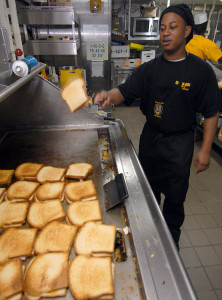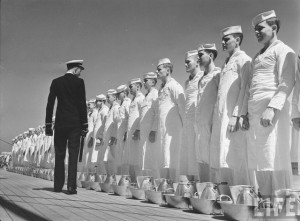The United States Navy has, according to CNN, 323,000 active duty service members, many of them housed in close quarters — yet it is able to avoid major outbreaks of contagious diseases like those seen on commercial cruise ships.
“If we had a norovirus that took out 700 sailors, we obviously would be operationally ineffective, combat ineffective — but even a smaller  number, a smaller outbreak of, say, 100 would devastate our operational capability,” Capt. Jim McGovern, commanding officer on the USS Iwo Jima, said aboard his ship docked in Norfolk, Virginia. “Serious outbreaks of 10 or 20 individuals being sick are taken very seriously.”
number, a smaller outbreak of, say, 100 would devastate our operational capability,” Capt. Jim McGovern, commanding officer on the USS Iwo Jima, said aboard his ship docked in Norfolk, Virginia. “Serious outbreaks of 10 or 20 individuals being sick are taken very seriously.”
Some 3,200 sailors and marines fill the amphibious assault ship when it deploys, and each of them are medically screened and inoculated before being allowed to embark.
“The idea is to prevent somebody from getting ill. Once you do become ill from one of these highly contagious organisms, you are really chasing it then,” Vice Adm. Matthew Nathan, Surgeon General of the Navy, told CNN.
“One person touches something, then three people touch that and they become infected, then three people from them, and pretty soon you’ve gone from 1 to 3 to 9 to 27 and that is how a cruise ship, in short order, has 700 people come down.”
Onboard a warship like the Iwo Jima, sailors are required to report to sickbay if they feel unwell.
“They come to us for sick call, and if they are particularly stoic and don’t want to come to us for whatever reason, their supervisor will make them come,” said Sean Sullivan, the vessel’s senior medical officer.
If a sailor does become ill with a contagious disease, they will be isolated so the infection does not spread.
“You monitor the movements of everybody who is ill. You make sure they are staying away from the general population on the ship. They  are not to go to their work station, they are not to go to the food places,” Nathan said.
are not to go to their work station, they are not to go to the food places,” Nathan said.
Keeping vessels extraordinarily clean is part of the daily routine for everyone onboard U.S. Navy ships.
In the kitchens, cleaning is constant to prevent foodborne illnesses.
“It’s important to keep it clean because cross-contamination is a big factor for illnesses,” said Jakeila Owens, Iwo Jima culinary specialist.
Just in case crews in the galleys miss something, preventive medicine technicians like Aaron Ferguson inspect multiple times every day.
They are “making sure their hands are clean, uniforms are clean, they have hairnets on properly, making sure their lines are clean, so there is not dirt buildup or anything like that which could get people sick,” he said.
